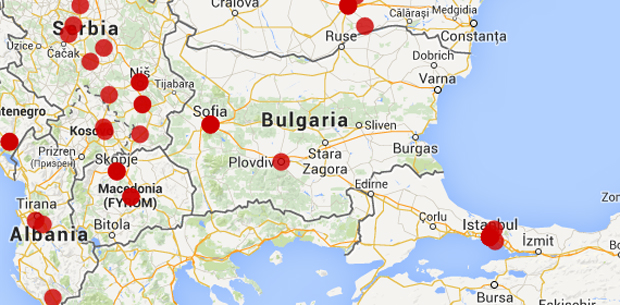
Index on Censorship and Osservatorio Balcani e Caucaso are joining forces to map the state of media freedom in Europe. With your participation, we are mapping the violations, threats and limitations that European media professionals, bloggers and citizen journalists face everyday. We are also collecting feedback on what would support journalists in such situations. Help protect media freedom and democracy by contributing to this crowd-sourcing effort.
Bulgarian journalists covering the financial beat can breathe freely as the most controversial parts of the so-called “bank censorship” amendment to the criminal code have been removed by the legal committee of the national assembly.
In July, parliament adopted the amendment on first reading. The text of the draft outlined sentences of two to five years in prison for circulating “false or misleading information” about banks that could “cause panic”.
The amendment was suggested indirectly by the Bulgarian National Bank (BNB) after a series of bank runs involving Bulgaria’s fourth largest credit institution, the Corporate Commercial Bank (CCB) and later an unrelated run involving financial institution the First Investment Bank (FIB).
It is still unclear who was behind these incidents. The run against CCB was likely caused by disagreements between media tycoon Delyan Peevski, one of the CCB’s large depositors and his old friend, Tsvetan Vasilev, the owner of CCB. Peevski started to remove funds, sparking a bank run which undermined the bank’s liquidity.
In the FIB case, three people have been arrested. They are suspected of spreading rumours about the imminent bankruptcy of FIB via emails and short text messages to the bank’s clients. This stirred mass panic, as people rushed to withdraw their money from the bank: in a few hours, BGN 800 million (£327 million) were withdrawn.
“Society is very sensitive especially to issues that affect the financial and banking stability as the memory of the banking crisis in 1996-1997 is still fresh,” said Petya Stoyanova, a financial and banking journalist from Bulgaria. During that crisis, 14 Bulgarian banks collapsed.
The memory of the mid-1990s financial crisis is the main reason behind the low public confidence in the Bulgarian banking system, which can easily be moved to panic. As a response, BNB proposed an amendment to the criminal code on 1 July stating that those who “disseminate misleading or untrue information on a bank or a financial institution that could create panic among the population, be punished with five to 10 years of imprisonment”.
BNB also proposed a fine ranging between BGN 5,000 and BGN 10,000 (£4,061) to be imposed in such cases. People causing significant damage or those having received significant illegal revenues through the aforementioned activities would be punished the same way.
According to Stoyanova, the proposals have been criticised by politicians and lawyers because of its vague language which, in a broad interpretation, could lead to a conviction for dissemination of any information related to the banking sector, even if it is not false or misleading.
After the first reading of the amendment in parliament, members of the legal committee applied a number of corrections. The revised amendment removes the danger of censorship by tightening up the language, which now refers to disseminating “false” banking information. While the potential fines for those spreading such information were increased, the possibility of prison has been eliminated.
The banking scandals hinted at the dimensions of backstage political machinations in Bulgaria. Stoyanova believes responsibility for malicious behaviour should have a place in future changes to the criminal code. Future lawmakers, she said, should not be allowed to quickly alter laws in violation of rules and best legislative practices, without public discussion.
The second reading of the amendment will be left to the next national assembly, as parliamentary elections will be held on 5 October.
More reports from Bulgaria via mediafreedom.ushahidi.com
Election law amendment could limit press freedom
Attacker sprays substance in Bulgarian sports journalist’s face
Bulgarian journalist beaten by football fans
Newspaper reporters attacked, threatened in Bulgaria’s city of Plovdiv
Arson Attack Against Bulgarian Journalist Genka Shikerova
This article was posted on 13 August 2014 at indexoncensorship.org




